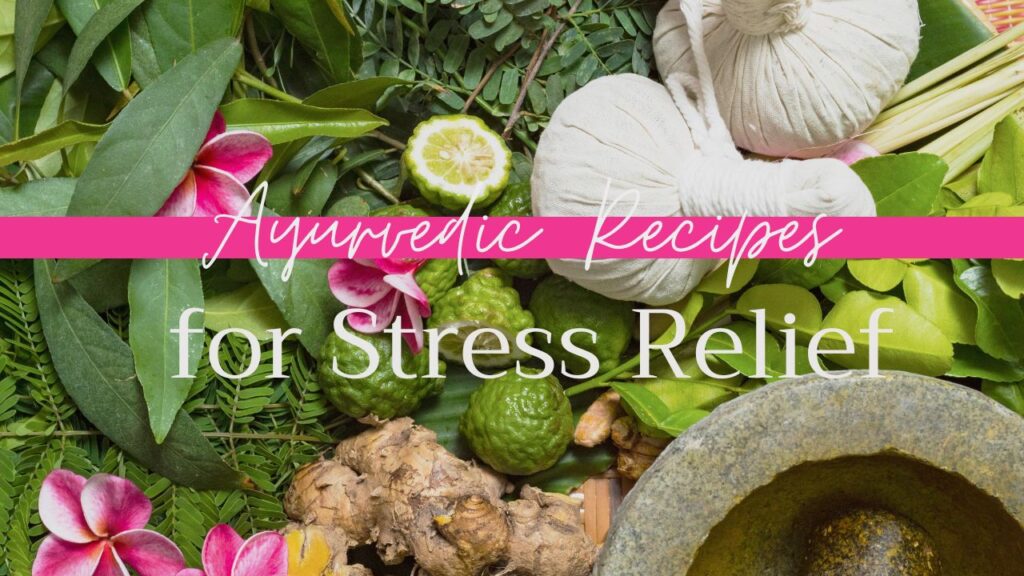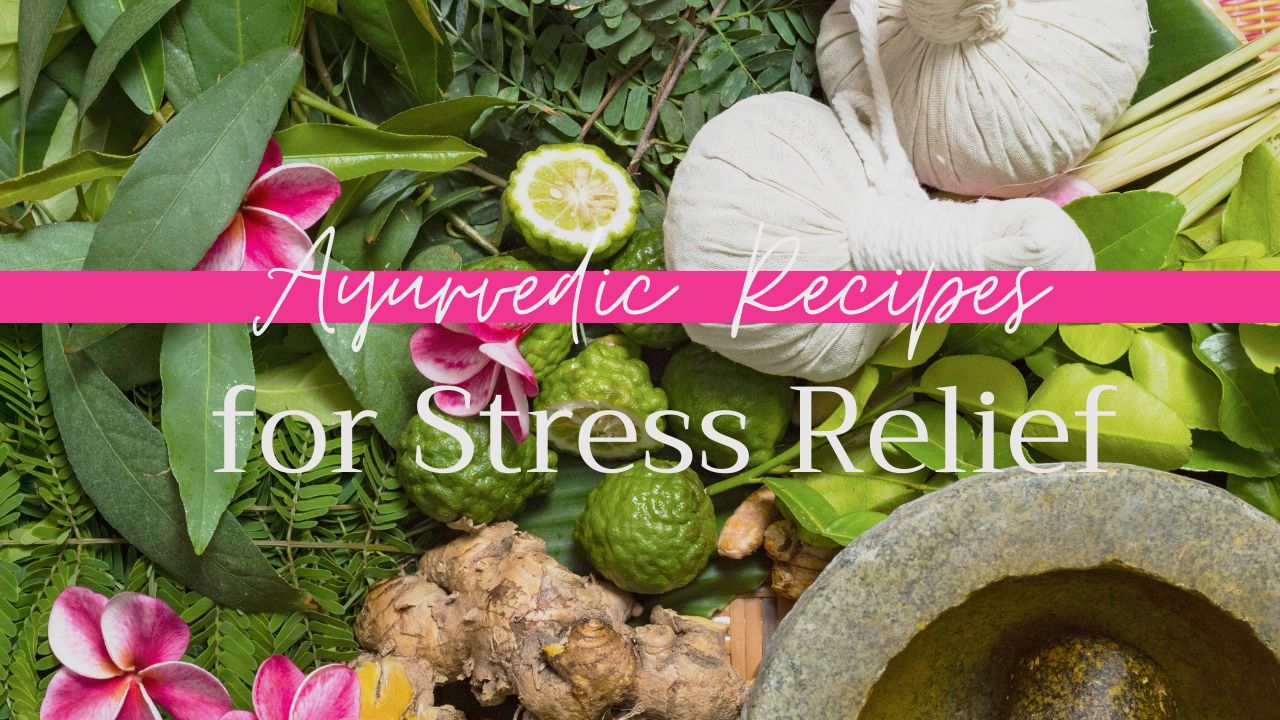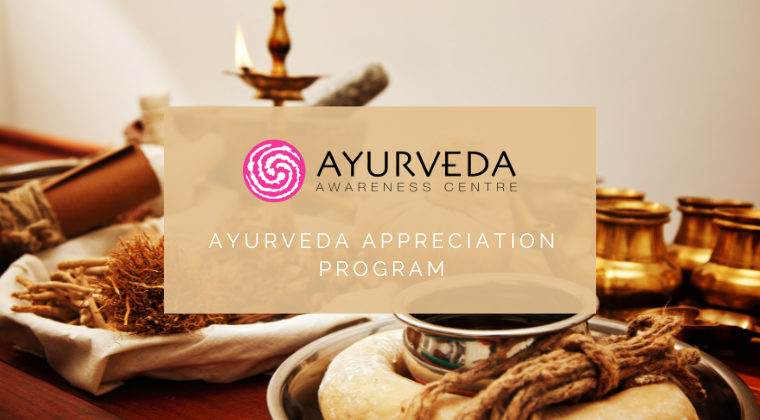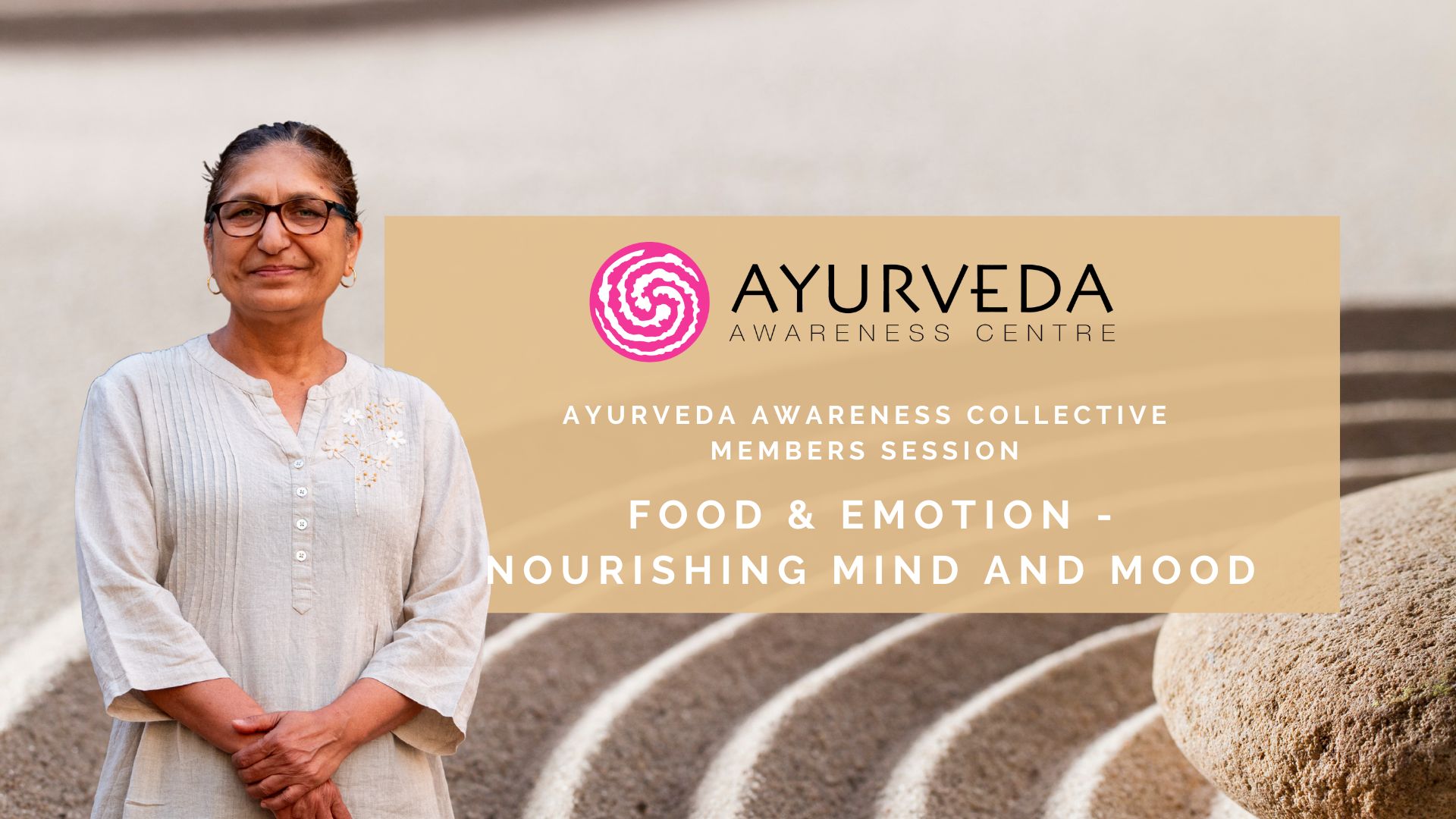
Simple Ayurvedic Meals, Teas & Snacks to Soothe Your Nervous System
Food as Comfort, Food as Medicine
Stress is part of modern life, but relief can be, too. In Ayurveda, stress is seen not only as a mental phenomenon but as a full-body experience that disturbs our natural rhythms. The mind becomes restless, digestion weakens, and energy scatters. When that happens, one of the most immediate and tangible tools we have is the food we eat, and how we prepare it.
Ayurveda teaches us that food is not only fuel, it’s medicine. And more than that, it’s a source of deep emotional nourishment when prepared and consumed with care. Cooking can become a healing ritual. Eating can become an act of returning to yourself.
In this blog, you’ll discover warm meals, soothing teas, and grounding snacks, each rooted in Ayurvedic wisdom and designed to support your nervous system, uplift your mood, and bring a little peace to your day.
Cooking as a Path to Calm
Long before we taste the first bite, the process of cooking can begin to relieve stress. The chopping of vegetables, the slow stirring of a pot, the fragrance of spices opening in ghee, all of it invites us to return to the present moment. This simple rhythm is something our nervous system recognises as safe and predictable.
From an Ayurvedic perspective, stress, especially the type that feels anxious, restless, or ungrounded, is often due to an increase in Vata dosha. Vata thrives on movement, and when aggravated, it brings excess motion to the mind and body, like, racing thoughts, scattered attention, poor sleep, and digestive irregularity.
Cooking warm, moist, gently spiced food at home is one of the most direct ways to pacify Vata. It roots us in the now, and it fills our environment, and our bodies with prana (life-force) in a form we can absorb. Simply put, cooking becomes a daily practice of stability and care.
Ayurvedic Principles for Soothing Stress with Food
Not all food calms the body. In fact, the qualities of what we eat directly influence the qualities of the mind and nervous system. Here are a few guiding Ayurvedic principles to create meals and drinks that support stress relief
- Favour warm over cold: Cold or raw foods can aggravate Vata and weaken digestion. Warm meals, warm teas, and gently cooked ingredients are more comforting and easier to digest.
- Include healthy fat: Ghee, sesame oil, or a little coconut oil help ground the mind and nourish the tissues. Ghee especially supports ojas, the subtle essence linked to resilience and immunity.
- Mild, calming spices: Choose digestive spices like cumin, coriander, fennel, cardamom, cinnamon, ginger, and nutmeg. These enhance flavour and improve agni (digestive fire) without overstimulation.
- Sweet, sour, and salty tastes: These three rasas (tastes) help pacify Vata. Sweet potatoes, ripe fruits, dates, rock salt, and lemon juice are good examples.
- Avoid stimulants and dryness: Coffee, excess chilli, overly dry or crunchy snacks, and processed foods can spike nervous energy or cause depletion.
Above all, choose fresh, whole ingredients, and prepare them with presence. As Ayurveda reminds us, how you cook is just as important as what you cook.
Warm Meals That Nourish and Ground
When stress leaves you feeling depleted or scattered, warm, nourishing meals can act like a gentle embrace from within. Ayurveda recommends sattvic foods, pure, fresh, and filled with prana to support clarity, calmness, and emotional stability. The following recipes are simple, balancing, and ideal for pacifying Vata and Pitta, which are commonly aggravated during periods of mental strain.
1. Calming Khichari for Everyday Reset
A simple Ayurvedic classic to soothe digestion and the mind.
Ingredients
- ½ cup yellow moong dal (split mung beans)
- ½ cup white basmati rice
- 1 tbsp ghee
- ½ tsp cumin seeds
- ½ tsp coriander powder
- ¼ tsp turmeric
- A pinch of grated fresh ginger
- 4 cups water
- Rock salt to taste
- Chopped coriander leaves (optional)
Method
- Rinse the rice and dal thoroughly.
- In a saucepan, melt ghee and add cumin seeds until they pop. Add ginger, coriander powder, and turmeric.
- Add the rice and dal and stir gently.
- Add water and bring to a boil. Reduce heat and simmer for 25–30 minutes or until soft.
- Add salt to taste. Garnish with fresh coriander if desired.
Why it helps
This gentle, one-pot meal is easy to digest and grounding for both the gut and mind. It’s especially helpful after a long day or during emotionally turbulent times. As optional extra, you can add root vegetables like carrots or sweet potato or even pumpkin to make it nourishing one pot meal. The consistency will be thick pumpkin soupy.
2. Sweet Potato & Mung Dal Stew
A grounding and sweet dish that balances energy and emotions.
Ingredients
- ½ cup split mung dal
- 1 medium sweet potato, peeled and cubed
- ½ tsp cumin seeds
- ½ tsp fennel seeds
- 1 tbsp ghee
- ¼ tsp turmeric
- 1 tsp fresh grated ginger
- 1 tbsp chopped coriander
- 3 cups water
- Rock salt to taste
Method
- Rinse mung dal and cook with water until halfway done (about 15 minutes).
- In a separate pan, heat ghee, add cumin and fennel seeds, then ginger and turmeric.
- Add sweet potato cubes and sauté for a few minutes.
- Add this to the simmering dal and cook together until soft.
- Season with salt and garnish with coriander.
Why it helps
Sweet potato brings in the grounding ‘sweet’ rasa, mung dal is light and sattvic, and the mild spices kindle agni without being harsh.
3. Warm Oat & Almond Porridge with Spices
A comforting breakfast or light evening meal to wind down the system.
Ingredients
- ½ cup rolled oats
- 1 cup water + ½ cup milk (cow’s or almond or other)
- 1 tbsp chopped dates or raisins
- ¼ tsp cardamom powder
- Pinch of cinnamon
- 1 tsp ghee
- Crushed almonds (optional)
Method
- In a pot, combine oats, water, milk, and dried fruit.
- Cook over low heat until soft and creamy.
- Stir in spices and ghee just before serving.
- Top with a few crushed almonds if desired.
Why it helps
This dish is warm, sweet, and calming. It promotes steady energy, and the subtle sweetness supports the nervous system and enhances ojas.
Optional – You can use rolled barley or other grain if you like.
Let me know if you’d like any of these as a printable recipe card or downloadable PDF for your readers.
Teas and Warm Drinks to Settle the Mind
When you’re feeling emotionally distressed, tense, or overstimulated, the act of pausing to sip a warm, sattvic drink can be a medicine in itself. In Ayurveda, certain herbs and spices help calm the mind, nourish the nerves, and gently bring the body back into balance. These teas and tonics are simple to prepare, yet powerful in their effects, helping to reduce anxiety, promote restful sleep, and enhance a sense of inner steadiness.
Here are some Ayurvedic drinks you can turn to in moments of stress or as a daily ritual for calm.
1. Ashwagandha Milk
A creamy evening tonic to support deep rest and resilience.
Ingredients
- 1 cup milk of choice (cow’s or almond or other)
- ½ tsp Ashwagandha powder
- A pinch of nutmeg
- ¼ tsp cinnamon
- 1 tsp ghee (optional but good for constipation as well)
- 1 tsp jaggery or maple syrup (optional)
Method
- Gently warm the milk bringing it to boil in a saucepan.
- Stir in Ashwagandha, nutmeg, cinnamon, and ghee. Whisk until smooth.
- Sweeten to taste and sip slowly, ideally before bed.
Why it helps
Ashwagandha is a renowned adaptogen that helps the body manage stress, reduce cortisol, and promote sleep. Nutmeg calms the mind (never overdo this, a pinch is enough), while ghee nourishes the nervous system.
2. CCF Tea (Cumin, Coriander, Fennel)
A classic Ayurvedic digestive and calming tea.
Ingredients
- 1/3rd tsp cumin seeds
- 1/3rd tsp coriander seeds
- 1/3rd tsp fennel seeds
- 1.5 cups water
Method
- Bring all seeds and water to a boil.
- Simmer for 5–10 minutes, and reduce to about 1 cup, then strain.
- Sip warm, especially after meals.
Why it helps
This tridoshic tea improves digestion (a key to mental balance), reduces bloating, and gently clears and detoxes the system. It calms Vata and Pitta without aggravating Kapha.
Stress-Relieving Snacks for Calm Energy
When we’re stressed, the body often craves comfort, but reaches for quick fixes like caffeine, sugar, or salty processed snacks. These offer temporary highs but eventually deplete our energy and disturb the mind. Ayurveda invites us to instead choose sattvic snacks—wholesome, freshly prepared, grounding, and gently energising.
The following recipes offer just that. They’re simple enough to prepare in advance, nourishing enough to stabilise your energy, and soothing enough to calm your system between meals or during a busy day.
1. Dates Stuffed with Tahini and Cardamom
A grounding sweet treat that supports ojas and balances emotions.
Ingredients
- 6 soft Medjool dates
- 2 tbsp tahini (or make your own sesame paste)
- ¼ tsp cardamom powder
- Optional crushed almonds or pistachios for garnish
Method
- Slice open each date and remove the pit.
- In a small bowl, mix tahini and cardamom.
- Fill each date with a small spoonful of the tahini mixture.
- Garnish with crushed nuts if using.
Why it helps
Dates are ojas-building and naturally sweet, tahini offers grounding fat and calcium, and cardamom is calming to the mind.
2. Spiced Ghee-Roasted Pumpkin Seeds
A crunchy, savoury snack that’s light but satisfying.
Ingredients
- 1 cup raw pumpkin seeds
- 1 tsp ghee
- ½ tsp turmeric
- ¼ tsp cumin powder
- Pinch of rock salt
Method
- Heat ghee in a pan, add pumpkin seeds and stir until they begin to pop.
- Add turmeric, cumin, and salt. Toss well.
- Let cool and store in an airtight jar.
Why it helps
Pumpkin seeds are rich in magnesium (great for stress), while turmeric and cumin aid digestion and reduce inflammation.
These sattvic snacks are not only soothing, they’re also deeply satisfying. Over time, they help retrain your system to crave what is truly nourishing.
Cook, Eat, and Heal, One Calm Bite at a Time
Stress may be inevitable but how we respond to it is a choice we can learn to manage. In Ayurveda, food is not just about nutrients. It’s about how you feel before, during, and after you eat. When you take the time to cook mindfully, to sip a warm tea slowly, or to pause for a soothing snack, you’re telling your body, you are safe, you are held, you are home.
Each of the meals, drinks, and snacks shared in this blog is an invitation to reconnect, to yourself, your body, and to the present moment. You don’t need to overhaul your entire diet. Start with just one recipe. Make it with love. Eat it with awareness. Let it become a daily ritual of calm.
And if you’re curious to explore more about Ayurveda and how it can support your physical and emotional wellbeing, we invite you to join our community, programs, or upcoming workshops.





